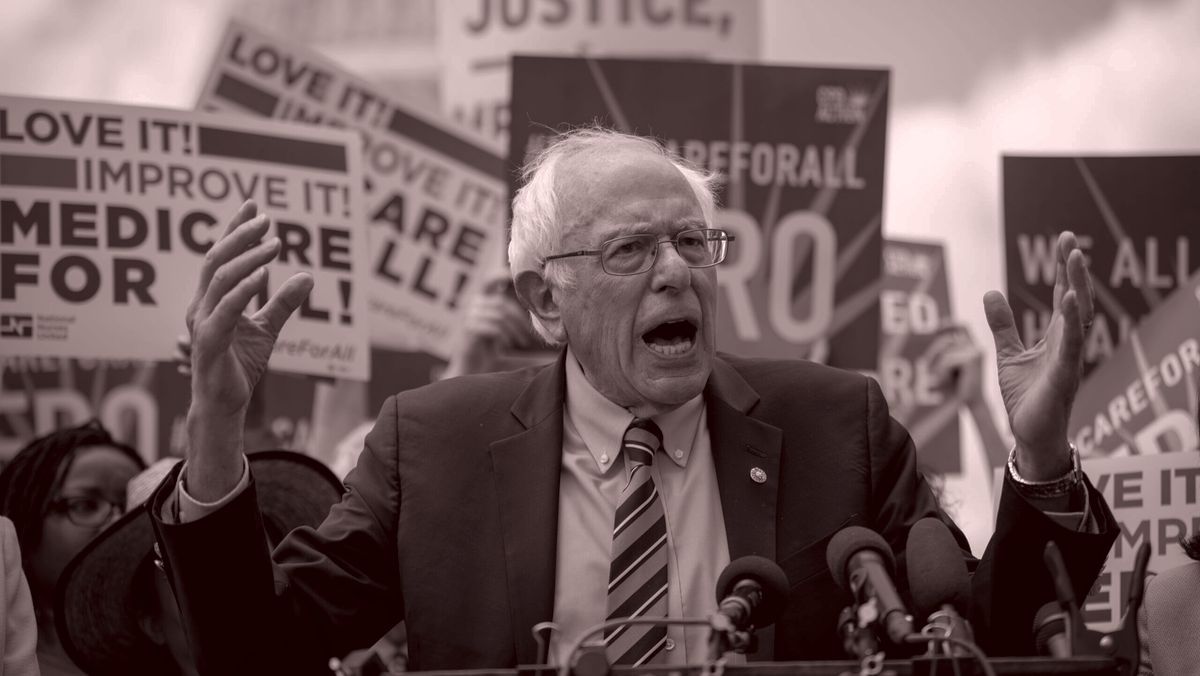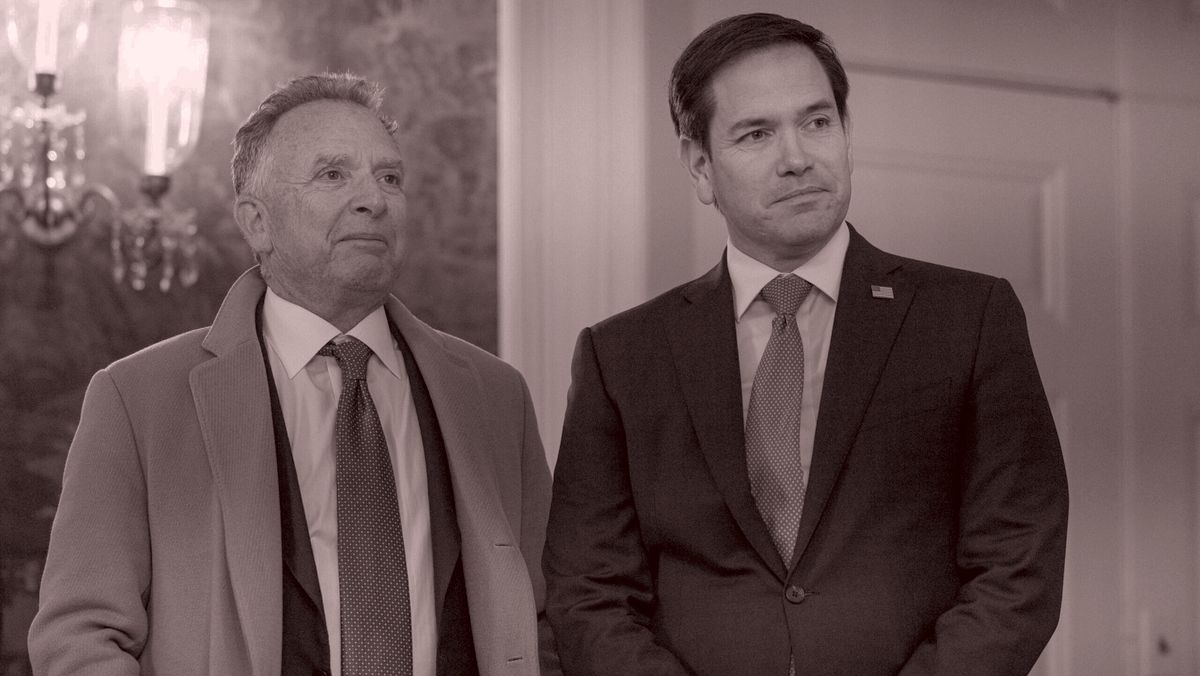Welcome back to The Best & The Brightest. I’m Leigh Ann
Caldwell, with you on another Sunday ahead of a busy week in Washington.
Yes, anger toward Elon Musk has erupted everywhere, and is reaching far beyond the liberal ecosystem. Two weeks ago, for instance, a nonpolitical friend asked me to explain DOGE. This week, she said her book club session had been dedicated to Musk’s chainsaw-wielding CPAC appearance
and Rep. Greg Casar’s viral clip in which he highlighted the $8 million per day that Musk’s companies receive in government contracts. But the new injection of energy in the Democratic Party does not mean everything is okay, or in any way suggest that a leaderless party has been united.
In today’s issue, the latest reporting and intrigue on those fault lines. A week after my
conversation with Rep. Adam Smith, I received a lot of outreach from members further to the left in the party who rejected any blame for the Trump landslide and current malaise. I also spoke with Bernie Sanders, Pramila Jayapal, and many others about their plans for what the party needs to become. Faiz Shakir, who ran Sanders’ 2020 presidential campaign and briefly ran for Democratic National
Committee chair, said that early signals from the party suggest that many Democrats are finally embracing Sanders’ message of economic equality. “It’s easy to be in opposition to Trump and Musk, because it codes as partisan,” Shakir told me. But are Democratic lawmakers willing to go after their own billionaires, too? More on that below the fold.
But first…
|
- Making
his-story: Trump’s insistence on forging his own version of reality, this time blaming Ukraine for initiating a war that Russia clearly started, is familiar in part because the playbook has been so successful. In the months after the 2020 election, for example, 55 percent of Republicans believed Trump had won
the election. By the fall of 2022, that number had climbed to 63 percent; in the summer of 2023, it was 69 percent, according to CNN polling. Meanwhile, Trump has unrelentingly shifted public opinion on the January 6 riot at the Capitol, by continuously and falsely insisting that they were peaceful protestors, despite all
video evidence to the contrary. (A recent Washington Post/Ipsos poll found that 83 percent of Americans oppose Trump’s pardons of people who were charged with violent crimes committed on that day, but don’t be surprised if that number decreases with time.)
There hasn’t been a lot of polling on the percentage of Americans who
think Ukraine started the war, presumably because it wasn’t a question that needed to be asked until Trump invented it. A YouGov online survey conducted this week found that just 6 percent of Americans think Ukraine started the war. I’m going to watch to see if these numbers tick up, should Trump double down on this spurious
counterfactual.
Americans remain overwhelmingly in favor of Ukraine over Russia, according to data shared with Puck by Echelon insights, but those numbers have softened over time as Trump and other members of the far right have shifted their rhetoric. Two years ago, about eight in 10 Americans said they sided more with Ukraine. Today, that number is below 60 percent. Among Republicans, it is closer to 50 percent.
North Carolina Republican Senator Thom Tillis,
despite giving a feisty speech in defense of Ukraine on the Senate floor Thursday, dismissed Trump’s Putin-friendly position as “growing pains” in the early stages of a new presidency, when “a lot of weird things happen.” He said that if the rhetoric and actions toward Russia are the same come April, he’ll be concerned. We’ll see…
- Mike Johnson in the hot seat: It’s another big week for Speaker Mike Johnson. A vote is
expected Tuesday on Republicans’ “one big beautiful” budget framework, which calls for $4.5 trillion to extend Trump’s tax cuts, and at least $1.5 trillion in budget cuts—moves which will likely touch Medicaid and other government benefits like SNAP. It’s still unclear whether Johnson can rally his razor-thin majority behind the bill.
The framework, which lacks policy details, could become a political liability for Johnson’s party. Democratic campaign officials are already preparing
attacks on members in swing districts for voting to extend tax breaks which disproportionately help the wealthy while slashing government services.
Vulnerable members are very aware of these dynamics, and Johnson has been working overtime to calm them, by reinforcing that this is just a first step to help move the process forward. He’s telling them that they’ll have a hand in helping to shape the policy—i.e., the correct balance of budget cuts and tax cuts, with an end
result they can justify to constituents. If he’s able to move this forward on Tuesday, it’ll be another win for Johnson, but the vote whipping will only get harder from here.
|
|
|
A month after the inauguration, rival Democratic factions are coalescing around the
potency of an anti-billionaire messaging. On the topic of pretty much everything else, however, they are aligned in agreeing to disagree.
|
|
|
Much has changed in the week since Rep. Adam Smith, the vocal
Washington State Democrat, professed to me that his party had moved too far left on issues of culture and inclusion. Smith, as you’ll recall, said that the Democrats had forgotten about personal accountability, and he called out the party for “framing everything as, It’s a human right—you know, healthcare, transportation, asylum, all of that—implying there’s no
responsibility on the other side. I think that message cost us some support.”
In recent days, however, previously bewildered Democrats have slowly been emerging from their post-election daze with a renewed sense of purpose, and maybe even rallying around a unified message. It’s a shift for those in the party who have spent the last three months finger-pointing and scapegoating each other for losing to a
convicted felon. Furious and fearful voters have been channeling their rage through the Capitol switchboard, jamming phone lines, desperate to get the ear of their representatives to vent about being fired from their government job, or the slashing of federal agencies, or the prospect of losing federal benefits. Several members felt the heat in person during a week back home in their districts, where town hall venues struggled to contain the masses of constituents or their anger. To
wit: Democratic Rep. Brad Schneider’s telephone town hall had 11,000 participants. Rep. Rich McCormick, a Republican from Georgia, was captured on video getting booed. The list of lawmakers being confronted by voters is long.
I’ve been told by lawmakers, aides, and fundraisers that the grassroots fury from activists and donors, alike, has finally started to break through to Democrats on the Hill. Members, however, are still trying to keep their voters’ expectations at bay until government funding runs out in a few weeks—their first real legislative chance to force Trump’s and Republicans’ hands. Interestingly, however, the pressure still hasn’t led to unity, and mistrust between the ideological
wings continues to simmer. Emblematic of the divide are two Washington State lawmakers who represent different parts of Seattle. Soon after I spoke with Smith, I heard from Rep. Pramila Jayapal, who took issue with the “Republican-light” perception of her party.
Jayapal told me she adamantly disagrees with Smith’s theory about the roots of Democrats’ losses. “We lost people because we did not, as a
party, focus on lifting up working people, on really speaking to people who felt like we weren’t fighting for them,” she said. “And a lot of that, frankly, came from centrist Democrats over the decades.” Jayapal pointed to moderate Democrats blocking Biden-era legislation such as housing assistance, which she says would have appealed to the Democratic voters who either stayed home or voted for Trump. “This is a difficult moment for us,” she told me, underscoring the
obvious.
|
Yet there are indications that, for the first time in years, Democrats may at least be
pulling together around a clear and concise economic message of the billionaires versus everyone else—the Bernie Sanders approach that has been shunned, and sometimes mocked, by the broader party in the past. That line of attack never gained much traction during the 2020 race, in part because Trump’s focus on cultural issues kept his opponents off-balance. But Elon Musk, the world’s richest man, firing tens of thousands of civil servants is a layup for
Democrats. The left couldn’t have dreamt up a better bogeyman than a billionaire laying off veterans while wielding a gold chainsaw at CPAC.
Sanders, the Vermont Independent who despises the Clinton wing of the party, has been preaching the same economic populist message since he ran for mayor of Burlington in 1981. “It’s no great secret that for the last many decades, Democrats have lost
the support of working-class people,” he told me. “One of the reasons is that, in fact, the party has been increasingly captured by big money, by consultants and by policies that have not benefited ordinary people.” But, Sanders continued, Trump’s unabashed embrace of oligarchs—and, frankly, the oligarchy’s reciprocal wet kiss—has provided an opportunity for Democrats to reengage their core constituency.
When
I spoke with Rep. Greg Casar, the new head of the Progressive Caucus, he agreed that Musk’s ascension had created “a real opportunity” for Democrats to win back the “broad swath of working-class voters” that was once central to the Democratic coalition but has been inexorably moving away from the party. According to Faiz Shakir, who operated Sanders’ 2020 presidential campaign and briefly ran for Democratic National Committee chair, early signals do suggest
Democrats are embracing Sanders’ message of economic justice for the working class. Still, he warned that it’s way too early to determine whether Democrats can be trusted as the pro-worker party. There’s a lot of culture war baggage that needs to be tucked away.
One Democratic strategist, who is still in the throes of conducting a review of the last election, said that the billionaires–versus–middle-class messaging is
directionally right. I’m told, however, that Democrats still aren’t convening meetings between intraparty rivals, to talk and strategize, nor are those much-needed conversations happening in the weekly House Democratic Caucus meetings. Instead, the issues are broached in group texts, where a lot is left unsaid. “It’s easy to be in opposition to Trump and Musk, because it codes as partisan,” Shakir told me. “The real integrity is if you’re willing to take on the wealthy class, even if some of
them might be supportive of you.”
|
|
|
Join Emmy Award-winning journalist Peter Hamby, along with the team of expert journalists at Puck, as they let you in on the
conversations insiders are having across the four corners of power in America: Wall Street, Washington, Silicon Valley, and Hollywood. Presented in partnership with Audacy, new episodes publish daily, Monday through Friday.
|
|
|
Unique and privileged insight into the private conversations taking place inside boardrooms and corner offices up and down
Wall Street, relayed by best-selling author, journalist, and former M&A senior banker William D. Cohan.
|
|
|
Need help? Review our FAQ page or contact us for assistance. For brand partnerships, email ads@puck.news.
You received this email because you signed up to receive emails from Puck, or as part of your Puck account associated with . To stop receiving this newsletter and/or manage all your email preferences,
click here.
|
Puck is published by Heat Media LLC. 107 Greenwich St, New York, NY 10006
|
|
|
|






















